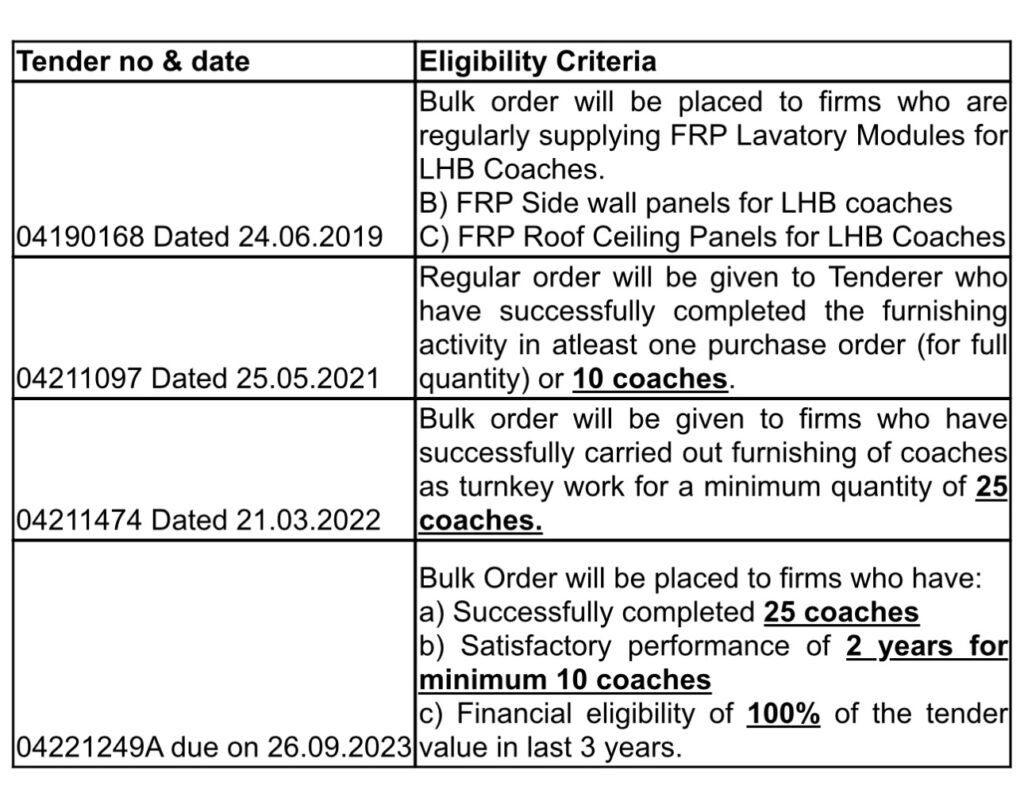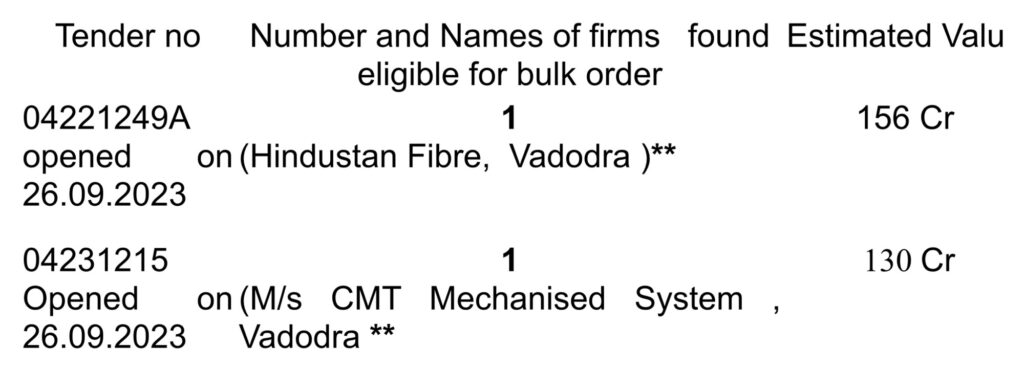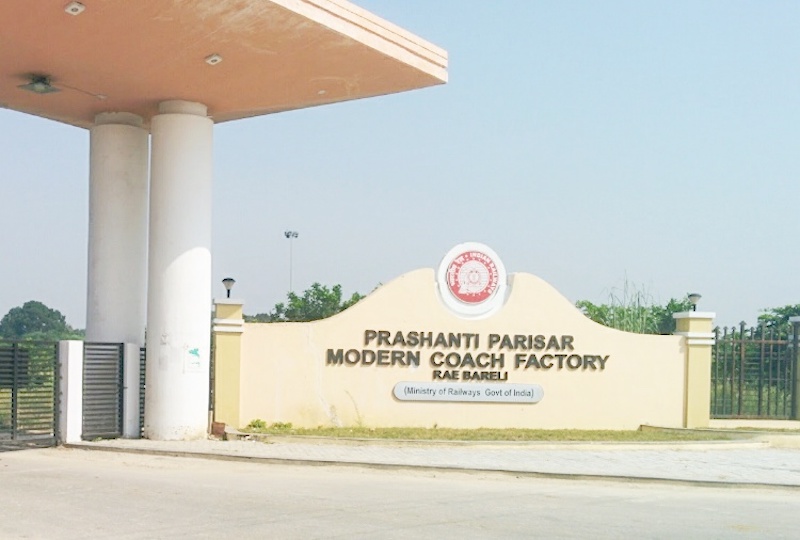Railgate-3: Unveiling Policy Corruption and Criminal Collusion almost identical to notorious Delhi Liquor Scam
#Exposed: Huge #Financial-Scam in Annual business of ₹1000 Crores #Turnkey-Contracts of furnishing new Coaches in Modern Rail Coach Factory (#MCF), Raebareli – Creating #monopoly/#oligopoly in favour of a single vendor and its sister concerns – Unveiling #Policy-Corruption and #Criminal-Collusion almost identical to notorious Delhi Liquor #Scam
Ref – (i) Letter No. 2023/RS(G)/779/4(E 3423823) dated 19.06.2023 containing eligibility conditions for turnkey contracts for furnishing of coaches.
Ref- (ii) Letter No. 2023/RS(G) /779/4(E3423823) Dated 19.09.2023 disallowing consortia/JV.
The present scenario epitomizes a blatant manifestation of #policy-corruption, laying bare the manner in which a virtual monopoly, favouring a specific #vendor, has been established within the confines of an approximately ₹2000 Crore annual business within the #IndianRailways sector. This starkly delineates a #criminal-collusion between select #Railway-officials and #private-vendors, orchestrated to illicitly amass personal gains, akin to the notorious Delhi liquor scam.
Vide aforementioned two #circulars; four additional #commercial-barriers have been introduced into the extant #eligibility-criteria, effectively barricading any prospective new entrants into this realm of commerce. This manoeuvre, orchestrated at the behest of the incumbent sole vendor, serves to stifle #competition and perpetuate a #monopoly over a business segment generating over ₹1000 Crore annually across all three Production Units (#PUs). Consequently, not only does this obstruct the entry of potential suppliers, but it also engenders significant #financial detriment to the #Railways. Hereunder live illustrations in brief-
Within the confines of the Modern Rail Coach Factory, Raebareli (hereafter referred to as #MCF), the ramifications have already translated into a fiscal shortfall of ₹11 Crore in just two #tenders opened last year in 2023. These tenders no. are – (i) 04221249A opened on 26.09.2023 of ₹156 Crore and (ii) 04231215 Opened on 26.09.2023 of ₹130 Crore.
The state of affairs prevailing in the current year is even more shocking, which is explained from the following facts-

i) The price of firms, who were otherwise #eligible as #Regular sources, but pushed back to the #developmental category not for their fault but purely due to revised restricted eligibility condition- ₹15,65,42,184/-
ii) The regular source value comes to ₹18,54,55,105/-
iii) Resulting in a loss up to nearly ₹3,00,00,000/-
₹3,00,00,000/- on 37 Coaches and at least 2000 coaches are manufactured with #Turnkey furnishing would result in a loss to the Indian Railways of approximately ₹160 Crore.
Surprising is that the sister company of the regular source who qualifies as a developmental source has also quoted price which is ₹3 Crores less. This is blatant #financial-scam and #cheating on Indian Government by restrictive and tailor-made eligibility criteria to ensure monopoly.
A) Tender No. 2

i) The price of firms, who were otherwise eligible as Regular sources, but pushed back to the developmental category not for their fault but purely due to revised restricted eligibility condition – Is ₹177,74,00,000/-
ii) Value of approved is ₹234,51,00,000/-
iii) Difference of ₹56,77,00,000/-
B) The above two tenders Cleary shows that huge financial advantage by way of financial criteria resulting in a loss of more than ₹200 Crore annually to the Indian Railways.
Should this egregious state of affairs persist, the resultant annual losses could burgeon into the hundreds of Crores, posing an enduring threat to fiscal integrity. To provide a comprehensive understanding of the matter, particularly regarding the implications and intentions behind the modified eligibility conditions that were introduced via aforementioned two circulars, it is prudent to offer some contextual background. This background will be elucidated in the following paragraphs for clarity and proper assessment-
In the context of the MCF, the responsibility for furnishing coaches is entrusted to private contractors through Turnkey Contracts. These #contracts are periodically released via tender processes, and the summarized eligibility criteria for these tenders are as follows:

It is undeniably evident from the preceding information that the eligibility criteria have undergone frequent and unjustified revisions in successive tenders, intentionally altering the #requirements with the malevolent purpose of impeding the participation of new #suppliers. In actuality, a specific entity (M/s Hindustan Fibre Vadodra), in #collusion with its sister concerns, has maintained uncontested dominance in this #domain since the inception of MCF, resolutely barring the entry of any fresh competitors. Unfortunately, their reprehensible strategy has thus far met with success, facilitated by their illicit collaboration with certain individuals connected to both #MCF and the #RailwayBoard namely #PCMM/MCF, #EDRS(G) #MKGupta & #EDME/Coaching #RaviJain. Presented below are compelling and conspicuous pieces of #evidence that substantiate these illicit activities-
Under Tender No. 04221249, opened by MCF Raebareli on March 16, 2023 of ₹400 Crore, a few new entrants met the stipulated eligibility criteria and became eligible to receive the bulk contracts. As a matter of fact, in the aforementioned tender, five firms were found eligible for regular bulk orders.
However, before the aforementioned tender could be finalized, eligibility conditions were modified. In subsequent tenders (i) 04221249A opened on 26.09.2023 of ₹156 Crore and (ii) 04231215 Opened on 26.09.2023 of ₹130 Crore, deliberate efforts were made to erect further barriers to entry, purportedly aimed at #disqualifying new contenders. Despite having met eligibility criteria in previous tenders, which were subsequently nullified, prospective entrants found themselves #disqualified due to several new entry barriers. Consequently, previous tender was abruptly cancelled after keeping it pending for 4 months, and two fresh tenders were issued and opened on September 26, 2023. The outcome of these fresh tenders is as follows:

** Both M/s #HindustanFibre, Vadodara, and M/s #CMT Mechanized System, Vadodara are under the control of the same group of individuals and operate in coordination. For any uncertainties, kindly refer to the #judgment of the #ChennaiHighCourt in WP No. 25008 of 2021 and WA No. 194 of 2002, delivered on 01.02.2022 and 28.04.2022, respectively. These #judgments resulted from a #complaint filed by the Integral Coach Factory (#ICF). While the Single Bench found them culpable of forming a #cartel, the Division Bench acquitted them on the grounds that the mens-rea behind the #cartelization was absent. However, of utmost significance, they ruled that the Competition Commission of India (#CCI) should proceed with its investigation into the charge of cartelization, and their judgment would not impede such an inquiry.
As regards M/s #ACME, they merely #sublet the #contract to M/s Hindustan Fibre. Cross-verification of origin and invoices of turnkey materials sourced by them against previous contracts shall stand testimony to this fact. More authentic and documentary evidence is the Inspection #Certificate issued by the #RITES against the past contracts, which clearly states that against #Contracts placed on M/s ACME, inspections were done at the premises of M/s Hindustan Fibre, Vadodra. In addition, tracking the payment trail between both of them is not a challenging task to establish this open truth.
It is evidently clear from the above that due to the #malevolent and premeditated actions, meticulously executed under the pretence of a #policy, four companies that were previously qualified for regular bulk orders were rendered ineligible and only single firm was found eligible and contracts were placed on them. In actuality, in one fell swoop, this criminal nexus obliterated all four firms entirely, nullifying all their prior efforts, energy, time, and financial investments.
Most notably, these additional entry barriers were imposed even for developmental orders. It’s worth noting the irony that numerous firms previously awarded developmental orders were now excluded, despite having successfully executed those orders.
In order to secure the #Board’s approval for their recommendations; Mr #MKGupta the then #EDRS/G Railway Board and Mr #RaviJain, #EDME/Coaching Railway Board presented information that led the Board to believe that as many as Eight firms engaged in turnkey business would meet the proposed eligibility conditions. However, the actual result stands in stark contrast, as discussed in the preceding paragraphs; only one firm and its sister concern were found eligible. Under the guise of policy, they effectively turned the entire business into an exclusive domain of a specific entity. Thus, they have successfully established a monopolistic regime favouring a single existing #supplier, who has treated #MCF as his personal fiefdom for the past decade. In reality, as a consequence of this policy, generations of new vendors will not even contemplate entering this business.
As regards additional entry barrier of 2 years performance evaluation, it is mentioned that this new #criterion, while seemingly introduced to monitor #performance, lacks clear and measurable parameters and serves as a tool to prevent the entry of new suppliers. Notably, the #coach-furnishing process inherently encompasses subjective aspects, encompassing tactile sensations, aesthetics, and overall appearance, which inherently resist straightforward #quantification and objective #validation. It is imperative to underscore that all materials employed originate from suppliers approved by the #Railways and undergo third-party inspections (#TPI). Furthermore, Railway authorities diligently conduct comprehensive post-furnishing assessments. Therefore, the imposition of a two-year performance evaluation, given its intrinsically subjective nature, appears to serve as a thinly veiled pretext designed to shield entrenched market incumbents while simultaneously erecting a #barrier against prospective newcomers.
One must ask whether the concerned officers at the Railway Board, responsible for introducing this new entry requirement, can indeed formulate and implement verifiable and quantifiable performance parameters, along with a subsequent monitoring mechanism, to evaluate the aspects of #furnishing objectively. The answer to this query is self-evident; such a task is inherently unfeasible. However, they have ostensibly employed the guise of performance evaluation, under the guise of vibrant colours, to obstruct the entry of new suppliers for another two-year period.
On record, #justification to incorporate additional entry barrier was given suggesting that past #complaints regarding the #quality of furnishing justified the necessity for performance evaluations. Assuming the veracity of such complaints, it remains an indisputable fact that over the past decade, nearly 75% of coach furnishing contracts has been awarded to a single entity (M/s Hindustan Fibre) or its affiliates. In light of this, one might reasonably expect that any lapses in quality would have incurred penalties. However, rather than penalizing these parties, they have instead been afforded additional safeguards, seemingly tailored to obstruct the entry of new firms that could potentially introduce #competition in terms of #quality and #price, both. Does this rationale seem logically sound? It serves as a prime illustration of unwarranted and unjustified favouritism extended to the existing #industry heavyweights.
Now reverting back to another new directive to the issue of #consortium, it is stated that the alleged exclusion of #consortia, based on a rationale purportedly beyond vendors’ control, exposes a coordinated effort with premeditated objectives. #PCMM/MCF allegedly sought guidance from the Railway Board on the #acceptability of consortia, a move considered unprecedented and questionable. In response, the Railway Board diligently sought specific information from him, which, regrettably, went unanswered. Subsequently, the Railway Board, in what appears to be undue haste, invoked the pretext of non-receipt of requested information from MCF to disqualify consortia. It is indeed a matter of incredulity that the decision of an apex authority to bar new entrants hinges not on the merits but rather on the non-receipt of information from a subordinate body. The answer to this conundrum is manifestly clear. By no reasonable interpretation can such action be deemed justifiable. This gives rise to yet another pressing inquiry: can #bidders be subjected to punitive exclusion on account of the inaction or lapses of PCMM/MCF? These weighty questions demand thoughtful answers.
Moreover, denying consortium participation egregiously contravenes the stipulations enshrined in Board’s letter no. 2002/CE-1/CT/37 dated 07.09.2011 which mandates the explicit acceptability of consortia or joint ventures in the tender of value more than ₹25 Crore. Given the nature of work involved in furnishing of coaches, it’s more a #work-contract rather than #supply-contract.
Furthermore, instead of merely asking, “Why should consortiums be permitted?” it becomes our solemn duty to pose the more pertinent question, “What detrimental consequences arise from allowing them?” Regrettably, it appears that implicated Railway officials within MCF and the Railway Board may be serving as intermediaries for a select coterie of established large vendors who have maintained an unyielding grip on the market since the inception of MCF. These officials seemingly deliberately, sidestep this straightforward query and tenaciously labour to obstruct the entry of new suppliers through any conceivable means at their disposal. Else, there exists no reasonable justification for the prohibition of consortiums, a stance that, in the final analysis, robs the railways of the attendant benefits stemming from heightened competitiveness.
It is worthy of #recognition that consortia, particularly in the context of high-value composite and hybrid tenders such as the present, manifest exceptional suitability, affording the #opportunity for two or more entities to combine their resources throughout the development and delivery phases. This collaborative approach inherently fosters economies of scale, enhances operational efficiency, and augments overall effectiveness. Importantly, it demands emphasis that consortia are unequivocally committed to full compliance with the eligibility criteria delineated within the tender, without any request for #waivers or #concessions in this regard. Consequently, the decision to disallow their #participation lacks legitimate #administrative justification or expediency, appearing to be primarily motivated by an illicit intent to confer unrestricted and unchallenged dominance upon existing suppliers, thereby impeding the entry of new entities into the marketplace.
They spent months disregarding the multitude of representations against your malicious and motivated actions, hoping for a last-minute miracle to absolve them of their sins. Upon realizing their egregious actions were brought to light, they begrudgingly reviewed the policy and submitted revised recommendations for approval to the Board Member (#MTRS) back in February 2024. However, for the past two months, this individual has wilfully chosen to sit idly by, taking no action or making any decisions. This blatant disregard for duty is nothing short of deliberate, as evidenced by the fact that during this period, the Modern Rail Coach Factory (#MCF) has issued two tenders amounting to ₹500 Crore, plagued by the same tainted eligibility conditions. The reason for the Board Member’s inaction becomes glaringly obvious: their primary objective is to ensure that these tenders are finalized with the same defective eligibility conditions that favor a specific vendor. Such #abuse of power, driven by a desire for illicit gain through criminal collusion, is unprecedented and disgraceful within the annals of the Indian Railways.
In view of the aforementioned circumstances, an urgent appeal is made for the dismantling of alleged alliances hindering new entrants and ensuring justice prevails. This action is essential to promote competition, prevent artificially inflated prices, and eradicate practices that have allegedly hindered the market over the past decade.


